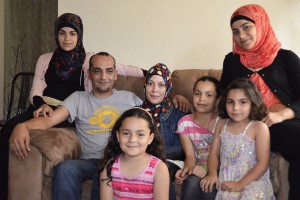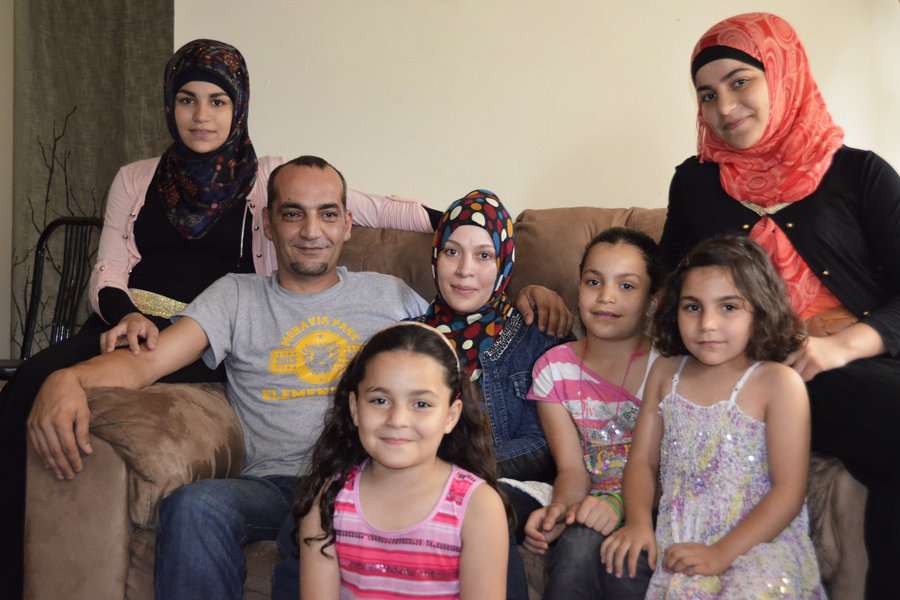BY DAVID H. SCHANZER AND ROBIN KIRK
The call by politicians across the country, including Gov. Pat McCrory, to halt the admission of refugees from the Syrian civil war is a travesty. This ill-considered decision strengthens the politics of fear that ISIS spreads, undercuts our long-term efforts to combat extremism and abandons long-standing American values of providing safe haven to those escaping the ravages of war.

Mohammad and Linda Jomaa al-Halabi, along with their five daughters, are among the fewer than 1,000 Syrian refugees who have been resettled in the U.S. They left Syria in August 2012 and arrived last year in Baltimore, where they live now.
Michele Kelemen/NPR
Instead of reacting out of fear, our thinking about the Syrian refugee crisis should begin with understanding that ISIS’s core goal is to convince Muslims around the world that they are not welcome in the West and can never live as a “true Muslim” in a liberal democratic society. The West, in ISIS’s eye, is the oppressor of Muslims and must be violently confronted.
The Muslim Americans already here demonstrate the lie of ISIS’s ideas. They serve in our armed forces and as police officers; they hold elected office; they teach and coach sports teams; and they support our civic life as health care workers, lawyers and community leaders. Like Christians, Buddhists and Jews, many arrived on our shores as refugees from war.
Exploiting the crisis
Our refugee program supports the American ideal that people can succeed in the United States, regardless of race, faith or ethnicity, so long as they work hard, abide by the rules and embrace an open, tolerant, pluralistic society. This is the essence of anti-ISIS thinking.
ISIS wants to exploit the refugee crisis to prove that, underneath all the rhetoric, America and its European partners don’t put these principles into practice. ISIS wants to show that the West loathes Muslims. They would far prefer Syrian civilians remain where they can be forced into service by ISIS, or, better yet, radicalized to take up arms against those ISIS labels “infidels.”
Our paranoia about the small number of Syrian refugees we are admitting into the United States helps ISIS make its case. It sends a message to the world, and to Muslims living in the United States, that Americas fear that Muslims are inherently violent. Presidential candidate Jeb Bush made this explicit, saying, “We should focus our efforts as it relates to refugees for the Christians that are being slaughtered.” A North Carolina legislator has gone so far as to recommend that the 44 Syrian refugees already peacefully settled here be deported back to the war zone in Syria.
Like other refugees, Syrians are carefully screened before boarding a U.S.-bound flight. While refugees arriving in Europe walk, we’re able to carefully review applicants before allowing them on flights. Our system is time-tested and reliable. Most refugees are women and children. Once here, families are often supported by churches because they see welcoming refugees as a core part of their mission.
Going beyond tactics
Anti-refugee voices claim that the system isn’t perfect. No system is. Some have pointed to the passport found at one of the Paris sites and the refugee roots of the Tsarnaev brothers, responsible for the Boston Marathon bombings, as reasons to slam the door to more refugees. But the origin of the passport remains unclear. What is obvious is that most of the attackers were European Union citizens.
The Tsarnaevs’ radicalization took place years after they arrived in the U.S. as children. Of course, no one knew, or could possibly predict, when Dylan Roof was in elementary school that at age 21 he would be charged with killing nine people at a church in Charleston. There is no basis for believing refugees present any greater public safety threat than others in our society.
It’s worth underscoring that none of the thousands of Syrian refugees already in the United States has been linked to any act of terrorism. To the contrary, these families quickly enroll their children in school, find work, worship and do their grocery shopping alongside the rest of us. One day, they or their children may become American icons, like Steve Jobs (Syrian), physicist Albert Einstein (German), actor Andy Garcia (Cuban) or Madeline Albright (Czech).
Welcoming refugees wherever their origin goes beyond tactics. Americans take in families fleeing tyranny because that’s who we are – or better yet, who we aspire to be. We are a people who fight for liberty, for family, for hope. We are generous and strong. We don’t retreat in the face of threats. We proclaim that the decency of humankind will prevail over hopelessness and savagery.
David Schanzer is the director of the Triangle Center on Terrorism and Homeland Security at Duke University’s Sanford School of Public Policy. Robin Kirk is co-director of the Duke Human Rights Center at the Franklin Humanities Institute.

